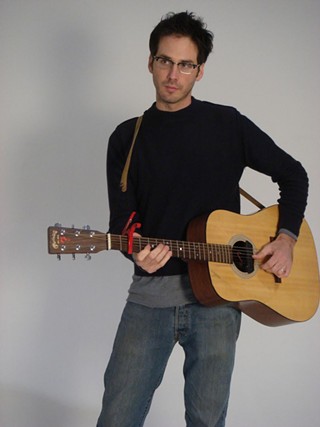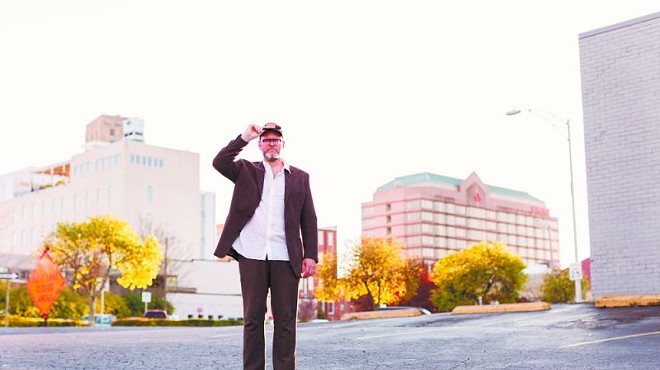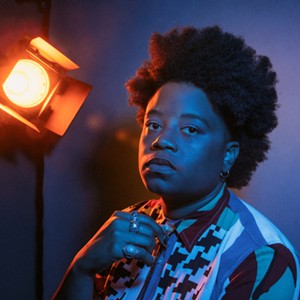THOUGH he’s played for thousands in gilded theatres, including our own Lucas, Eef Barzelay has found that he’s right at home performing in other people’s homes.
Several years ago, the creative force behind beloved indie band Clem Snide teamed up with Undertow Music Collective and was sent off on a tour of house shows. These days, it’s his preferred method of connecting with fans.
It’s a fitting environment: Barzelay is an exquisite songwriter, his lyrics possessing equal parts tenderness and sly whimsy. The cozy hush of a living room is the perfect place to catch every careful word.
Clem Snide, named after a recurring character in the novels of William S. Burroughs, spun indie rock that channeled jazz, old school country, and folk. As the band was growing, the music industry was collapsing—they released an album on Sire Records in 1999, but the band dissolved in 2005. Barzelay struck out on his own, recording two solo albums, Bitter Honey and Lose Big. The band got back together for release a sixth album in 2009 and another in 2010; since then, the group’s songs have found a home on many popular TV shows, including Californication, Wonders of Life, The Good Wife, and Love.
Despite lineup changes, breakups, and the pains of navigating the music industry, Barzelay was always Clem Snide’s core. He released an album, Girls Come First, under the moniker in 2015.
The Savannah stop on Barzelay’s living room tour is a little different as it’s being held at Revolution Yoga studio (shoes off, please!). We spoke with the singer-songwriter about film scoring, the fluidity of Clem Snide, and playing intimate shows for complete strangers.
You’ve done these Undertow shows for some time. What does that experience offer you as a musician?
It’s pretty much the way I [play shows] now. When you’re at this level that I find myself in, it’s definitely the best way to do it. It was real strange at first when the idea presented itself to me—my friend Bon Iver told me about it, and at first I recoiled at the idea. I thought it would be so awkward and weird, but it’s great. It does get a little weird; sometimes it does feel like I’m hosting a Tupperware party.
There’s some magic in the separation and having a stage that makes whole performances larger than life, but this brings it right down to reality. You lose something, but you gain a kind of intimacy that’s amazing. It’s something a lot of artists who play big venues, I imagine, secretly long for. There’s no PA. Sometimes there’s a potluck. Sometimes,I’ll stay in the guest room. It’s a different kind of relationship to have with your fans. And it’s all Internet-enabled. I don’t think this could exist without social media.
How have these type of shows changed over time?
I think it’s become such a thing now...the first ones I did were kind of awkward. Showing up at a stranger’s house, it’s like coming to a party at someone’s house that you don’t know, basically. Sometimes it’s a small living room, you’re sharing a couch cushion with somebody, and it’s really quiet. I think people have become more accustomed to it in the Northwest. I haven’t done too many in the Southeast.
You said this is the best way for you to tour now. Why?
Part of that was just by default. I kind of got chewed up and spit out by the music business. When we got into the game in the late ‘90s, it was already starting to change. Then the Internet rose, and it completely changed everything. A lot of that has been me trying to survive in this new world with what I can.
It’s like how the Chinese symbol for tragedy is also the one for opportunity. I never would have made it big, so to speak, but I get to have all these really cool friendships with people based around what I do in my work. Some I’ve known for 10 years now.
I have a family, a wife and two kids, but I’m not very social. So when I do these home shows, I get to commune with my fellow humans. I toured with Ben Folds, and even on his level, you’re in a bubble. It’s backstage to the stage to the hotel. You never hang out with people, just yourself or your band. That can be glamorous, but it’s also weird and lonely.
How do you distinguish your solo work and your work as Clem Snide?
It’s a little confusing. That last record was a Clem Snide record I dribbled out—Girls Come First. I could have just as well called it an Eef Barzelay record. We haven't been a Clem Snide band for at least seven years...it's kind of just me. I wrestle with it. Sometimes, I think it's better to release as Clem Snide, but from here on I want to be Eef Barzelay. But if I meet some people and start a new band, I keep myself open to possibility.
Do you prefer to write alone?
I've done some co-writing...I haven't had all that much success with it generally. I kind of know what I want to be if the song reveals itself to me. My dream is someone comes in and takes care of all the music for me, arranges, and plays on the record.
You've written for film too; how's that challenge you as a songwriter?
It was never one of those things I never really considered doing seriously, but about ten years ago Jeff Blitz, a writer/director, was a big Clem Snide fan and was writing a movie and listening to Clem Snide while doing it. He made this movie, Rocket Science, and he wanted some Clem Snide songs in the movie without the vocals. We didn't have that, so he inadvertently hired me to score it. I had no idea how to do that! So I got into the world by accident.
It’s a lot of fun working on movies. The last one I did a few years ago with William H. Macy—I got these very intimate days with ole Bill Macy, what a weird, wild thing! God bless him. Nicest guy and exciting and weird to work with.
I like any kind of creative challenge. Two years ago, I stumbled into another similar situation and wrote a little turnaround for a yogurt company, Chobani greek yogurt. They put me in a commercial and I did the voiceover stuff! I’d never done that before; that’s exciting for me. I don’t look at any work as beneath me. I think that’s the artfulness of it. It’s just as hard to write for a commercial than anything—even harder. It’s very constrained. It puts a restriction on artistic freedom, and I appreciate the challenge of it.




























